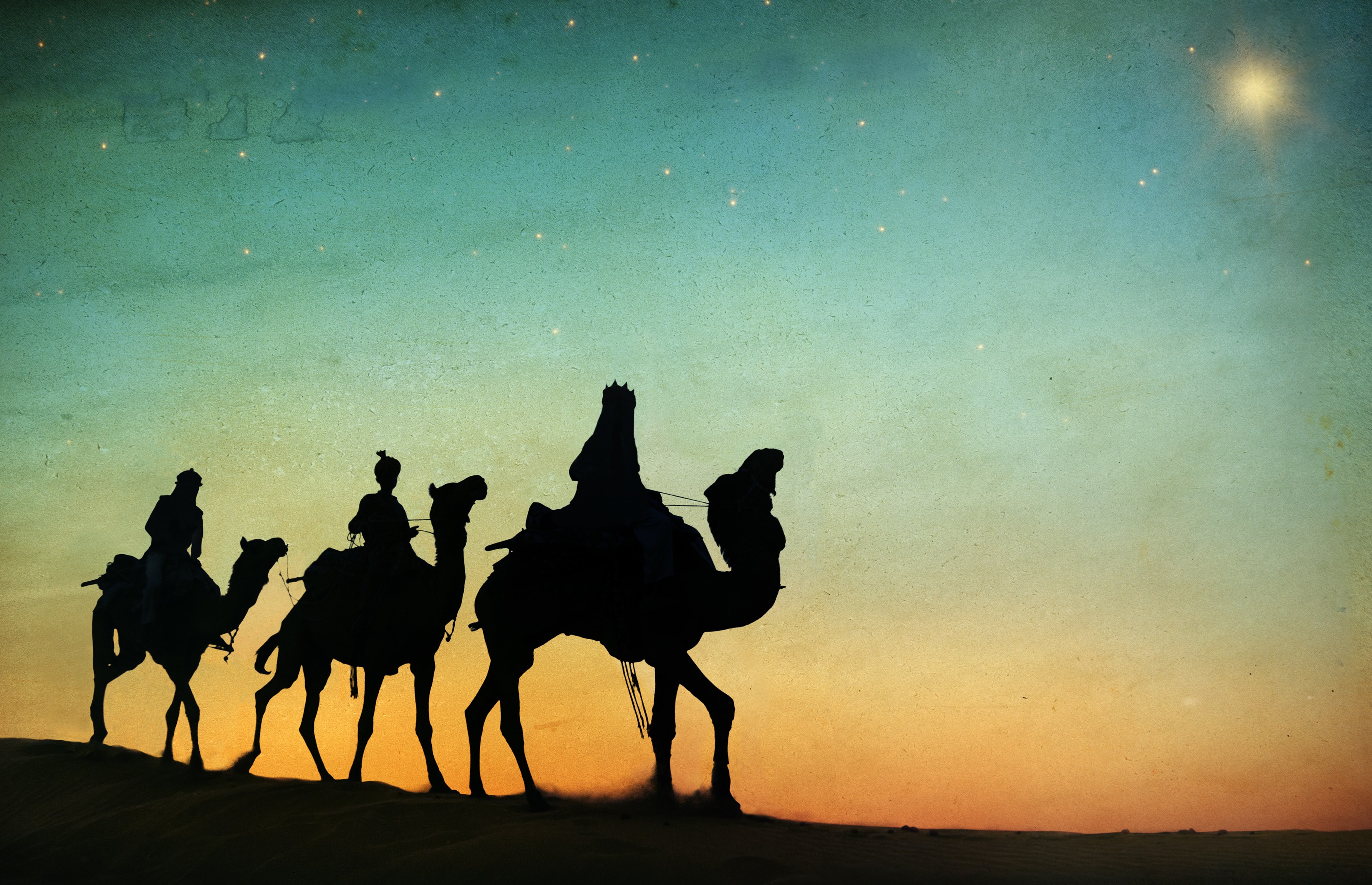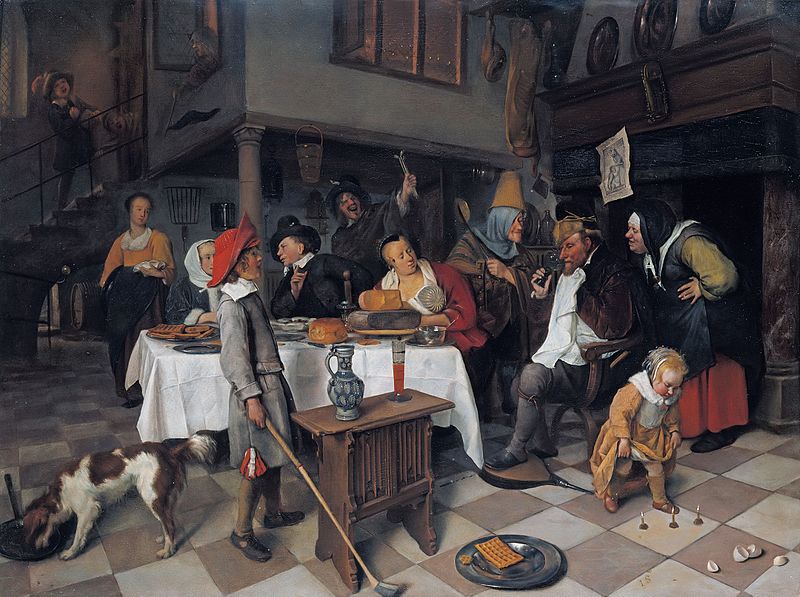
* * * *
I’ll talk about the 12 Days of Christmas in a bit, but first a note about 1st Kings 17:21. There’s a story there about the prophet Elijah bringing back to life a boy who had died. The interesting part is where he prays, “O LORD my God, I pray, let this child’s soul come back to him.”
That was the Old Testament reading for Thursday, December 30,* and when I read that it raised some questions. Like, “Where did the boy’s soul go? Where did it come back from? And does that passage have an effect on any of the pressing hot-button political issues of today?” Note too that many translations say “let this child’s life come back to him.” However, the King James Version – the one God uses – has the term “soul,” and that’s good enough for me.*
Another good passage I just ran across – in the readings for Christmas Day – was 1st John 4:8. The translation I like best is the Contemporary English Version, “God is love, and anyone who doesn’t love others has never known him.” Which can be a good response to those Facebook users who seem to revel in spreading hate. (“Are you acting out of love? Like Billy Graham?”)
But enough of that. Back to the 12 days of Christmas.
For starters, let’s go back before the Covid to The 12 days of Christmas, 2018-2019. That post noted that those 12 days of Christmas don’t end until “next year,” on January 6:
The Twelve Days of Christmas is the festive Christian season [including “Twelfth Night”] beginning on Christmas Day … that celebrates the birth of Jesus Christ, as the Son of God. This period is also known as Christmastide… The Feast of the Epiphany is on 6 January [and] celebrates the visit of the Wise Men (Magi) and their bringing of gifts to the child Jesus. In some traditions, the feast of Epiphany and Twelfth Day overlap.
Then there’s the post from January 2015, on the same 12 Days of Christmas, which also noted that people apply a number of different names to this 12th day, January 6. For example, aside from The Epiphany, it and those days close to it are also known as Plough Monday. Three Kings Day (as in, “We Three Kings of Orient are”), and Twelfth Night.
The latter feast day was immortalized by artists including Jan Steen, whose painting “The King drinks” is shown below. In fact, the custom of eating and especially drinking too much became such a problem it was banned in some places: “Twelfth Night in the Netherlands became so secularised, rowdy and boisterous that public celebrations were banned from the church.”
For more on these topics, check Epiphany, circumcision, and “3 wise guys,” and To Epiphany – “and BEYOND!” The “Three Wise Guys” posted noted that in its original sense – circa 600 A.D. – the term Magi meant “followers of Zoroastrianism or Zoroaster.” Also, the tradition that there were three kings started because they brought three gifts: Gold, frankincense, and myrrh.
Then there’s the tradition that the Three Wise Men got to the manger-scene just after Jesus was born, but the truth seems harder to pin down. Some say they arrived the same winter Jesus was born, while others say they came two winters after his birth. That would explain Herod’s order – see Matthew 2:16–18 – that his soldiers kill “all the male children that were in Bethlehem, and in all the borders thereof, from two years old and under.” (Known to history as the “Massacre of the Innocents,” noted every December 28.)
Finally – recalling events from this past year – there’s “Gleaning” on the Epiphany – 2021. For the calendar-challenged, that was 11 months ago, when Epiphany coincided with the day Congress (was supposed to) Count Electoral Votes. (The link is to an article dated January 5, 2021.) Which made 2021’s Epiphany “yet another ‘like no other’ in American history.”
In that post – from last year near this time – I picked “three earlier posts to glean from,” along with a reflection on how “gleaning” came to have multiple meanings. Along with a reflection on a mid-winter trip I took the year before, three months before the Covid pandemic “hit the fan.” Referring back to a post from January 17, 2020, My recent Utah trip noted this:
[T]he end of an old year and beginning of a New Year is also a time to recall the events of that past year gone by, and 2019 was definitely a year of pilgrimage for me. Like my trip last May to Jerusalem and the Holy Land. (See “On to Jerusalem, On my first full day in Jerusalem, or type in “Jerusalem” in the search box above right.)
Which is another way of saying that 2019 was a “pilgrimage-filled year,” ending with a 15-day solo road trip “out to and back from my brother’s house in Utah.*” All of which brought back fond memories – of “before Covid” – with recalling that “This too shall pass.”
I ended that “Gleaning” … 2021 post with this thought: “Here’s hoping for a much better 2021.” So now I’ll close this post by saying, “Here’s hoping for a much better 2022.” And I’m going to keep saying it, updating it every year, until that much-better year finally happens…
* * * *

* * * *
The upper image is courtesy of Epiphany – Image Results. See also Epiphany (holiday) – Wikipedia.
Re: Old Testament reading for Thursday, December 30, 2021. That’s according to the two-year course of daily Bible readings set out at pages 934 to 1000 at the back of the Book of Common Prayer. See Daily Office Lectionary – The Online Book of Common Prayer, and/or What’s a DOR?
Re: The King James Version of 1 Kings 17:21 using the word “soul.” The Revised Standard Version also uses the term “soul” rather than “life.”
Re: Acting out of love “like Billy Graham.” I wrote about him in the post, A Soldier of Christ – “and BEYOND!” I first listened to a book-on-CD version of The Preacher and the Presidents: Billy Graham in the White House. (Nancy Gibbs and Michael Duffy.) Then I got a copy of the book itself, through which I learned that as he grew in age, Graham “also grew in grace.” (See 2d Peter 3:18.)
In fact, Graham eventually grew in grace so much that he came to say that God loves all people – even Liberals. Which led some Fundamentalists to criticize him “for his ecumenism, even calling him ‘Antichrist.’”
I recently started re-reading portions of the book, which convinced me that I should try to be more like Billy, in the purity and inclusiveness of his faith. (Instead of referring to Right-wing Wackos as – well, “Right-wing Wackos.”) On a related note, in 2018 I published an eBook, “There’s No Such Thing as a Conservative Christian”: and Other Such Musings on the Faith of the Bible. In light of my determination to be “more like Billy,” I’ll be revamping that book for a new version tentatively titled, “There ARE still some open-minded, tolerant and caring Christians… (‘You know, the REAL ones?’)” Or something less confrontational like that. And toning it down a bit.
Re: January 6 having many names. See also Happy Epiphany – 2018, which noted this Feast Day‘s names include Epiphany proper, which “celebrates the revelation of God incarnate as Jesus Christ.” It’s also known as the last of the Twelve Days of Christmas, and it’s the evening of January 5 that’s called Twelfth Night.)
A note: 2019 included, in September, a 160-mile hike on the Portuguese Way (of the Camino de Santiago), from Porto to Santiago. The mid-winter road trip to Utah included “getting snowed in at a Motel 6 in Grand Island, Nebraska, with a view of a near-frozen North Platte River,” but which also included “a great burger and two draft beers at the Thunder Road Grill at the truck stop next door.”
The lower image is courtesy of File:A Twelfth Night Feast – ‘The King drinks’, by Jan Steen.
* * * *


